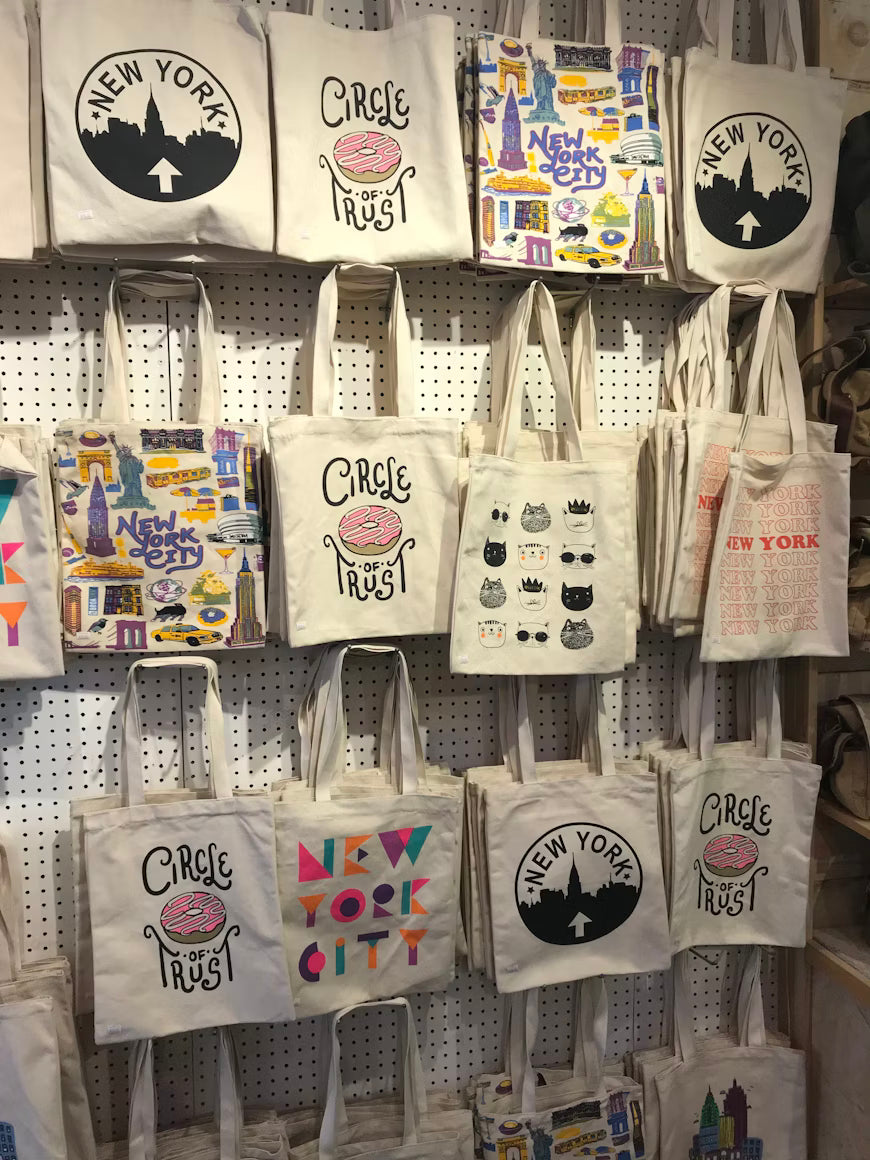Lightweight plastic shopping bags were once handed out by the billions, but in 2025 the classic canvas tote (and other reusable bags) reign supreme. If you walk into a grocery store or mall today, you’re likely to see shoppers carrying their own durable bags rather than relying on single-use plastic. This shift didn’t happen overnight – it’s the result of growing environmental awareness and changing policies worldwide. Here’s why reusable bags are winning the battle against plastic bags in 2025:
Plastic Bags: Pollution and Problems
Plastic carryout bags may be free and convenient, but they come with hidden costs. Globally, we still use on the order of 1 to 5 trillion plastic bags each year, yet less than 5% are recycled. Most end up in landfills or as litter. Because plastics don’t biodegrade, a bag you toss today could linger for centuries, breaking into microplastics that contaminate soil and water. Wildlife often mistake bags for food – countless marine animals (sea turtles, whales, seabirds) have died from ingesting plastic bag fragments or becoming entangled.
The sheer scale of plastic bag waste has driven governments to act. Over 90 countries have instituted bag bans or fees. The European Union mandated reductions in plastic bag use starting in 2015, and many member states now charge for bags or ban the thinnest ones outright. In the U.S., states like California, New York, and others have banned single-use plastic grocery bags, forcing a switch to reusables or paper. Canada implemented a nationwide ban on plastic checkout bags in late 2023. These measures have led to dramatic drops in consumption – in England, a small fee on plastic bags led to a 90% decrease in usage by major retailers. The writing is on the wall: the era of the flimsy throwaway bag is ending.
Reusable Bags: Durable, Practical, and Stylish
Stepping in to replace plastic are reusable bags, often made of canvas, cotton, or recycled materials. The classic canvas tote bag has proven itself a winner for several reasons: - Durability: A sturdy cotton or canvas tote can hold far more weight than a typical plastic bag without ripping. You can pack it full of groceries confidently. These bags are built to last for hundreds of uses. - Eco-friendliness: Each reusable bag can eliminate hundreds of single-use plastic bags over its lifetime. While producing a cotton tote has an environmental footprint, that impact is offset after repeated use. The key is to use your bags often – and people in 2025 are doing exactly that, bringing totes to supermarkets, bookstores, and beyond. - Convenience: Tote bags often have comfortable shoulder straps and a larger capacity, making shopping easier. They don’t cut into your hands like thin plastic handles and won’t burst open if you put something heavy or sharp inside. - Style and Personalization: Reusable bags have become a bit of a fashion statement. They come in countless designs, colors, and slogans. Many brands and non-profits offer branded totes, turning them into moving billboards for causes or style. Carrying a chic canvas tote not only signals you’re eco-conscious, but also adds to your outfit. In short, totes are cool now.
In 2025, grabbing your reusable bags before heading out is second nature for many – just like taking your keys or phone. In communities that introduced plastic bag bans or fees, residents adapted quickly and now wouldn’t think of shopping without their own bags.
Saving Money and Resources
Beyond environmental benefits, reusable bags can save money. Many stores give a small discount (e.g. 5 or 10 cents) for each reusable bag you use. Conversely, some places charge a fee if you need a disposable bag. Over time, those nickels and dimes add up. More importantly, communities save on cleanup costs; fewer plastic bags in circulation means less taxpayer money spent unclogging drains or cleaning parks.
There’s also a resource angle: plastic bags are made from fossil fuels (usually polyethylene from natural gas or oil). Reducing plastic bag production saves those non-renewable resources and cuts emissions associated with manufacturing. Reusables made from recycled materials or plant fibers further reduce the need for virgin plastic.
2025: The New Normal for Shoppers
All these factors contribute to why reusable bags dominate in 2025. In many places, it’s not just the “green enthusiasts” using totes – it’s everyone. Supermarkets sell inexpensive reusable bags at checkout, and many households have a collection of them by now. It’s become a habit to keep some in the car or by the front door so you don’t forget.
Shoppers have largely embraced the change. Surveys show people prefer a sturdy bag that doesn’t tear and can hold all their groceries. Any initial resistance (“oh no, I forgot my bags”) has faded as routines adjusted. In cities like San Francisco or Vancouver, walking down the street you’ll see an array of canvas and woven bags swinging at people’s sides, a far cry from a decade ago when plastic bags fluttered from every hand.
Crucially, this shift has real environmental payoff. Reports already document significant reductions in plastic pollution where bag bans are in effect. Fewer bags are being found in oceans and litter surveys. This is tangible progress toward cleaner communities and protecting wildlife.
EQUO’s Take: “Goodbye” Plastic Bags, Hello Sustainability
Companies like EQUO are part of this movement by offering sustainable bag options that make ditching plastic easier. EQUO’s product line includes reusable tote bags such as the “Goodbye Plastic” canvas tote, made from natural materials and designed for daily use. These bags not only replace dozens of disposable bags each week, but also spread the pro-environment message with their very name. EQUO’s mission is to provide people with convenient tools to live more sustainably, and a simple canvas bag is one of the most effective tools around.
In conclusion, the canvas tote and other reusable bags have emerged victorious over the plastic shopping bag by 2025 – and for good reason. They offer durability, reusability, and even a dash of style, all while drastically cutting down on plastic waste. With supportive policies and a cultural shift in consumer habits, reusable bags have become the norm. It’s a win-win-win: for shoppers, who get a better bag; for communities, which see less litter; and for the planet, which is a bit less burdened by plastic. The age of reusable bags is here to stay, and every time we sling a tote over our shoulder, we’re taking a small but meaningful step toward a more sustainable future.


